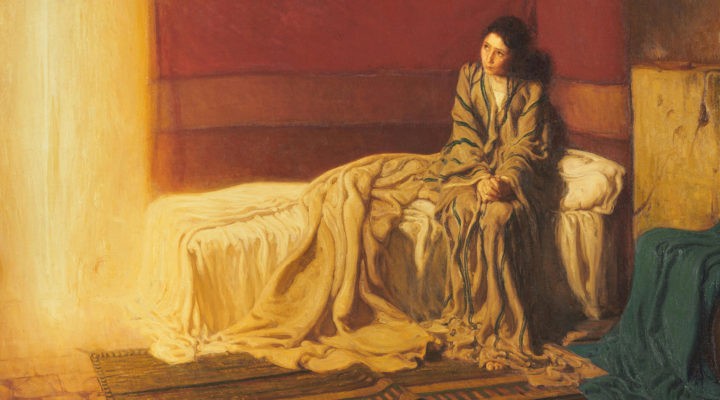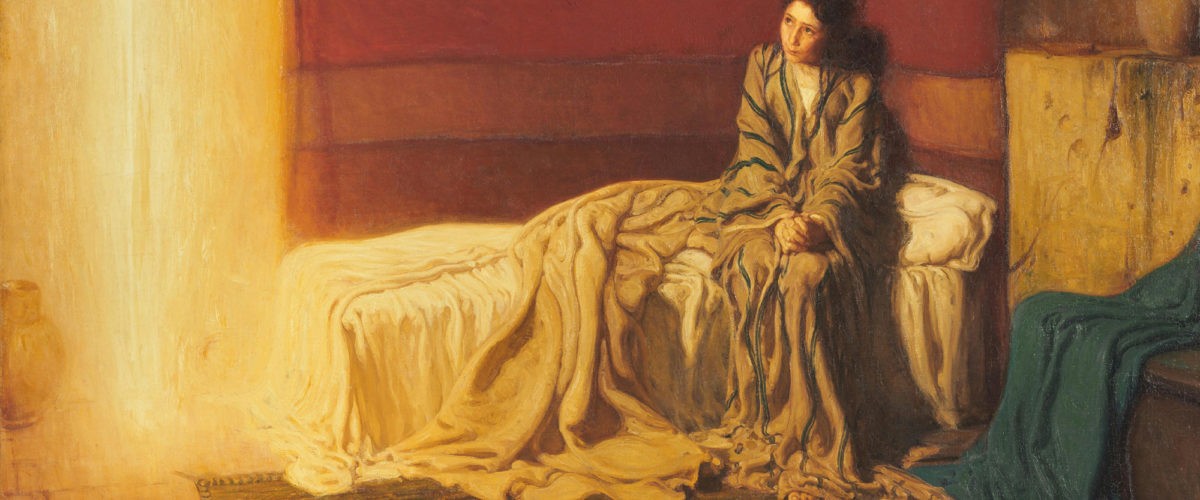I wanted to be an R.A. They had so much more fun than the G.A.s.
For those of you who have no idea what I’m talking about, for many years in Southern Baptist churches, Wednesday night programing for children was divided by gender: the boys went to Royal Ambassadors and the girls to what once was Girls Auxiliary but later Girls in Action by the time I was praying for long lists of missionaries on their birthdays.
While learning about missionaries around the world did come with some interesting information about other cultures, it just couldn’t compare with what the boys were doing. They were building fires, tying ropes and using pocketknives. Hearing each week about what my older brother did in RAs meant that I wanted to switch to his class.
The real trouble came when I finally was old enough to go to camp. You see G.A. camp was at the same campground as R.A. camp but on different weeks. From my brother’s previous experience of two years, I knew what to expect: I knew about the canoeing and hiking up the mountain. I knew about the archery and the leather stamping. I knew they played some sort of game in a mud pit, and I was ready.

(123rf.com)
A few days into my first week of G.A. camp we had made necklaces and bracelets, learned to cross-stitch, and taken a short nature walk. I asked my counselor about the canoeing and hiking and archery and leather and mud. I was told in no uncertain terms that those activities were for the boys.
I threw a royal fit as an ambassador for all girls. Nothing changed about the camp but something shifted in me. I always had been aware of a different standard: my older brother was expected to be a doctor or an engineer and I was asked if I wanted to be an artist or a teacher. I was expected to be like mother Mary: meek, mild, passive.
What of Mary?
But is Mary really meek, mild and simply accepting of whatever is thrown at her by a male-dominated society? Or is she rebellious and brave? I want to argue that our Christmas carols and artists through the years have done her a disservice in painting her with a subdued and submissive brush.
One might take such a view of Mary if one only reads the Gospel of Matthew. In Matthew, the angel visits Joseph with the news that Mary is pregnant. The angel tells Joseph, not Mary, all about this special baby.
“I want to argue that our Christmas carols and artists through the years have done her a disservice in painting her with a subdued and submissive brush.”
Joseph! Not Mary. Mary doesn’t have any spoken lines in the entirety of Matthew’s Christmas pageant. But in Luke, it is Mary who speaks with the angel. It is Mary who is given the news of her pregnancy. And then without any mention of Joseph, it is Mary who leaves her home in Nazareth and journeys all the way to her cousin Elizabeth’s in a Judean town in the hill country.
Women are disciples too
We know from the Gospel of Luke that there were women disciples, that women often funded the Jesus movement. We know they were involved in every aspect of Jesus’ ministry: “After this, Jesus traveled about from one town and village to another, proclaiming the good news of the kingdom of God. The twelve were with him, and also some women: Mary (called Magdalene) from whom seven demons had come out; Joanna the wife of Cuza, the manager of Herod’s household; Susanna; and many others. These women were helping to support them out of their own means” (Luke 8:1-3).
The Gospel of Luke doesn’t leave women in the manger tending the children and the animals. We read of women disciples and women’s role in Jesus’ resurrection — and in Luke’s second volume, the Acts of the Apostles, we learn of the prominence of women in the early church.
But have you ever seen a painting of Jesus where there are several women with him? I never have. Even in the movies, when Jesus is teaching his disciples, or they are going to heal someone, or they are traveling down the road together, there are rarely any women with them. Sure, when Jesus is feeding the multitudes, or speaking to the crowds, there are always women among the throngs of people, but when Jesus is speaking just to disciples, or when Jesus and the disciples are crossing the Sea of Galilee, all you ever see are men.
Rebecca West said, “Feminism is the radical notion that women are disciples, too.”
Giving Mary her due
Jesus challenged the conventional patriarchy of his culture. Jesus depended upon the ministry of women: he was ministered to by women, and he ministered alongside women. Jesus was surrounded by women and men as he went about including those who had been excluded. And before Jesus did this welcoming and including, before he began his ministry, he was conceived and grew in the womb of Mary.
Mary is startled by the presence of the angel. So were Gideon, Jacob, Jonah and the shepherds of Bethlehem. They, like Mary, questioned the angel in wonder, doubt and even resistance. The others are not noted for their reluctance. They are not called meek or mild. Why is Mary?
“The others are not noted for their reluctance. They are not called meek or mild. Why is Mary?”
I grew up with Mary mostly presented as quiet, gentle, meek and mild: hands folded in prayer, gazing adoringly at baby Jesus, never saying a word. In the churches that raised me, this was the role women were almost exclusively expected to occupy. Women did not pray or preach in worship, they did not even take up the offering. Women could not be deacons. A penis was required to be used by God in any sort of public and official way in the churches of my childhood.
What if Jesus were called not “Son of Man” the “daughter of woman?” Would it matter? What if a woman had walked along the sea calling names of those people fishing — what if she had said: “Come unto me Simone and Andrea and Jamie and Joanne, daughters of Zebedee?” What difference would it make? What if the church for thousands of years performed its rituals in the name of the Mother, the daughter and the Holy Spirit? Would it change things?
What if we heard the story differently?
If our religious narrative were told as the story not of Abraham, Isaac and Jacob but of Sarah, Rebecca and Rachel; not of a father who sacrifices a son but of a woman cloaked in sexual scandal laboring to bring new life, a promise of peace into the world, would things be different? Surely there would be more female clergy but what about the dominant way Christianity seems to be lived out?
The violence of patriarchy is deeply entrenched in the dominant telling of the Jesus story — a story often told this way: A judging angry Father God sacrifices his one and only Son as payment for the sin debt of all people. Starting from the birth of the baby in Bethlehem, it’s hard to imagine how different the story would be if Jesus had been a woman.
But maybe not …
As much as I would like to suggest that if Jesus were a woman, the world would be a better place, the text won’t let me. After all, Jesus was a refugee and yet thousands of people who claim to be Christians want refugees kept out, want immigrants turned away.
“As much as I would like to suggest that if Jesus were a woman, the world would be a better place, the text won’t let me.”
Jesus held up a Samaritan, a person of a different religion, as the best example of the way to be a neighbor, the way to follow the most important commandments of God, and yet many who claim to follow those same commandments feel threatened by Muslims.
Jesus’ skin was brown, likely dark brown, and yet thousands of men who look like Jesus are locked away in prisons, shot in the street, not hired, not given loans.
Jesus was radical in his welcome: his welcome of women, of outcasts, of those the dominant society excluded, and yet thousands who claim to follow Jesus reject and exclude people they don’t understand, don’t want to understand, cannot open themselves to see.
I am a Christian because I find inspiration in the teachings and the doings of Jesus. The title “Christian” is being used in ways that don’t represent me or, frankly, Jesus’ ministry — but I am not willing to give it up.
Give me Jesus
They can have R.A.s. They can keep G.As. too. What they can’t have is Jesus.
They can’t keep Christianity all to themselves deciding what it means. They can’t control who the disciples were, and they certainly can’t control who the disciples are now. This is about so much more than who Jesus was. It’s also about who we are and how we see ourselves as following — as doing and being and bringing radical inclusive love.
In the Middle Ages, more than a millennium after Jesus’ birth, Meister Eckhart, reflecting on the insufficiency of simply rehearsing the old, old story, wrote: “What good is it to me that Mary gave birth to the son of God 1,400 years ago (if) I do not also give birth to the Son of God in my time and in my culture? We are all meant to be mothers of God. God is always needing to be born.”
Men, women, genderfluid people, children, teenagers — all of us are called to be mothers of God, called to be like brave, prophetic, questioning Mary. We are called to smuggle God into the world.

Laura Mayo
Laura Mayo serves as senior minister of Covenant Church in Houston. She is a graduate of Carson-Newman University and Wake Forest Divinity School, with additional studies at Regent’s Park College of Oxford University. She is active in various interfaith projects and organizations in Houston.
Related articles:
Mary sings her joyful – and radical – faith. Do we have the courage to join her? | Opinion by Molly Marshall
Fox News anchor gives voice to 16 women in the Bible
Advent, race and the intimacy of incarnation: Why we must see beyond a white Baby Jesus | Opinion by Robert P. Jones


